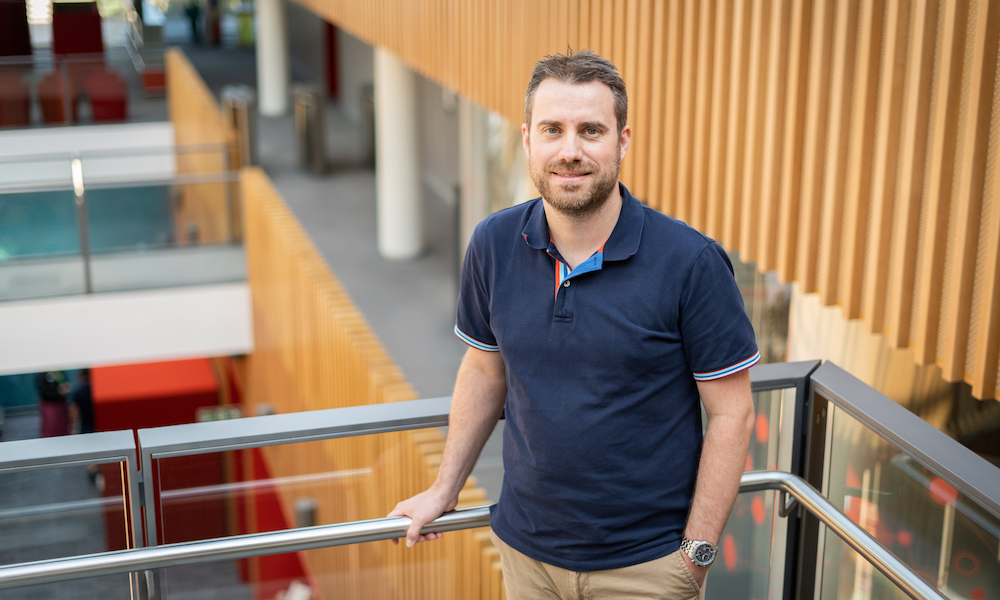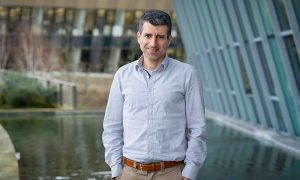
Peter Harrison – Genome Analysis Team Leader
Peter Harrison discusses the importance of data accessibility and his passion for biodiversity and agricultural genomics

Presenting data in a clear and easily accessible way to the scientific community is important for our tools, resources, and large scale genomics collaborations. This is where the work of Peter Harrison and his team comes in. Peter has had a successful career at EMBL-EBI and now that he has taken over as Genome Analysis Team Leader. We caught up with him to see what exciting projects lie ahead.
What is your professional background?
I’ve been at EMBL-EBI for six years. Before my current role as Genome Analysis Team Leader, I was a technical coordinator for the European Nucleotide Archive and before that, I was a Software Developer within Ensembl. At the start of the pandemic, I also worked on the COVID-19 Data Portal, helping with project management and coordination of the rapid delivery of a service to support the huge scientific sequencing effort.
Prior to working at EMBL-EBI, I was a postdoc at University College London and the University of Oxford. For these postdocs, I used de novo transcriptomics – looking at changes in the transcriptome without the use of a reference genome – to study the evolution of sex and sex-biased gene expression in birds, insects, and fish, with a particular focus on chickens and turkeys. Before this, I did a PhD in comparative genomics in bacteria at the University of York, looking at root nodule bacteria and their genetic structure.
What does your role entail?
I’m responsible for leading a number of teams that work on the Ensembl Project. I lead the infrastructure, applications, and regulation teams. The infrastructure team writes the code that supports all of the amazing science that Ensembl performs. The applications team focuses on building a range of tools and services that help other scientists to easily access our genomic data. And the regulation team works on the Ensembl Regulatory Build – a genome-wide set of regions that are likely to be involved in gene regulation, e.g. enhancers and promoters.
I also lead the Agricultural and Biodiversity Coordination team. This work focuses on biodiversity projects such as the Darwin Tree of Life project (DToL) and the European Reference Genome Atlas. As part of these projects, our teams at EMBL-EBI are helping to build data portals and provide data coordination to make the data from these projects FAIR – Findable, Accessible, Interoperable, and Reusable.
Finally, I manage EMBL-EBI’s involvement in the Functional Annotation of Animal Genomes (FAANG) project. This work aims to decipher links between the genotypes and phenotypes of farmed animals, so this is where my experience with farm birds comes in handy. As part of the FAANG project, my team and I help coordinate data submission, tools, and services.
What motivated you to work at EMBL-EBI?
During my time as a master’s and PhD student in bioinformatics, I became aware of EMBL-EBI. I was frequently using its data resources, including Ensembl, so when an opportunity came up to join them, it seemed perfect. I’ve always been a supporter of open access so this seemed like an excellent chance to work with a huge range of different communities and show them how beneficial it can be.
What are some of the challenges in your new job?
Moving into a new team is always a challenge and I’m also working on scientific areas that I haven’t thought about since my undergraduate days. Luckily, the team is amazing and has made the transition easy. I also love the opportunity this new role gives me to work with different communities that I wouldn’t have otherwise interacted with.
What is your approach as a manager?
Firstly, I’m incredibly lucky to have come into a well-established team. I think encouraging people to bring their ideas forward is really important. We are a very open, interactive team and we often discuss new ideas as a group. The people in my team get really excited about their work and it’s fantastic to see all of the amazing services they develop.
What is one thing we couldn’t find out about you from an online search?
One thing I love to do in my free time is play board games. My favourites are Terraforming Mars and the Castles of Burgundy. The other thing I like to do is geocaching – going out and solving puzzles in different places around the world. These puzzles come in a range of different types, they can be disguised in different ways, and hidden in unusual places. I get to travel quite often as part of my job so every time I go to a conference, in the evening after a long day, I like to nip out and find the local geocaches. I’ve done this all over the world but most frequently in San Diego when I go to the Plant and Animal Genome conference each year.


